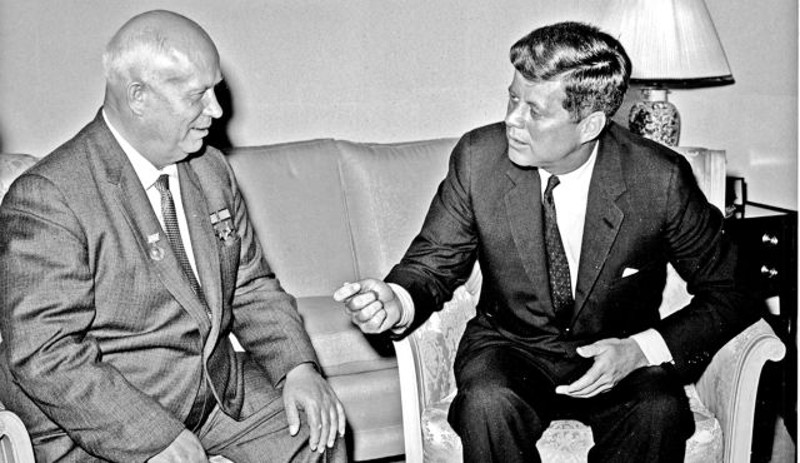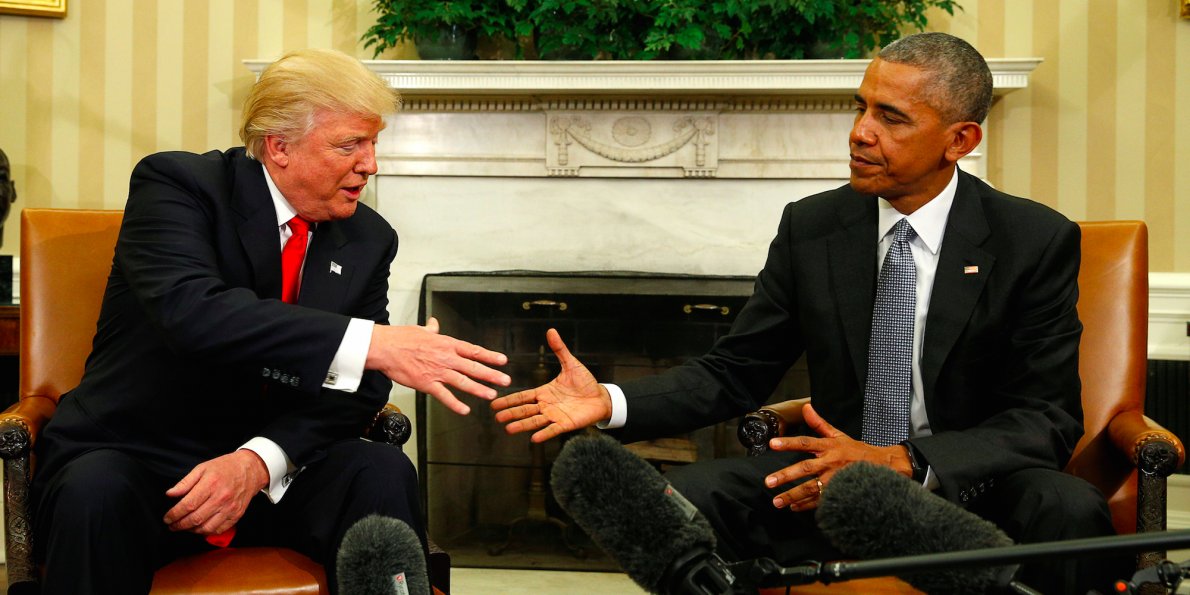Archive for category National Politics
The Democrats’ Assault on Free Speech Continues
Posted by Joshua Sharf in Constitution, National Politics, Political History on November 17th, 2020
Joe Biden has selected Richard Stengel to head up state-owned media for his transition team. This includes overseas media such as Voice of America and our Middle East Broadcasting Networks.
Stengel was an Under Secretary of State for Public Diplomacy and Public Affairs under the Obama Administration. Apparently, his big takeaway from that post was that the First Amendment’s free speech protections, being unique in the world, are deeply and profoundly flawed.
For some of us, American Exceptionalism is a feature. For the likely incoming administration, it is a bug. In the case of Stengel, it’s clear that he doesn’t even understand how the First Amendment protections of speech are supposed to work. He mocks that, “…the Framers believed this marketplace was necessary for people to make informed choices in a democracy. Somehow, magically, truth would emerge.”
There’s nothing magic about it, and there’s no guarantee that “the truth” will always emerge. Indeed, there’s no guarantee that there is a truth to emerge. The Founders believed, instead, that the government was a terrible vehicle for determining what speech was acceptable and what speech wasn’t. Anyone empowered to make those decisions would inevitably put his thumb on the scale, and a government empowered to do so would use that power to silence opposition.
For those of you on the other team, before you cheer too loudly, consider the possibility that you may not always be the ones defining “hate speech.” Along those lines, it is worth considering what will likely not qualify as “hate speech.” The Democrats consistently opposed extending Article VI protections under the Civil Rights Act to Jews, and consistently opposed adopting the IHRA definition of Anti-Semitism. I would oppose a “hate speech” exception to the First Amendment even if the Democrats had not reflexively opposed President Trump’s attempts to extend civil rights protections to Jews, however. Special protections extended can be special protections retracted, and even the threat to do so could be used to extract political concessions. That’s the point.
Many of us voted for Trump out of self-defense, to protect ourselves against the use of the government to attack us or censor us for our political or social opinions. Many of us were quite clear about that before the election. This sort of thing is exactly why.
From 70 to 2018
Posted by Joshua Sharf in History, Jewish, National Politics on July 20th, 2018

Sunday is the 9th of Av* on the Jewish Calendar. If Yom Kippur is universally recognized as the holiest day of the year, the 9th of Av, is unquestionably the saddest. It is the anniversary of the destruction of both the First and Second Temples. Jews around the world will mourn by fasting, reading the Book of Lamentations, and engaging in communal self-examination.
Self-examination for what, exactly? The Rabbis say that the Second Temple was destroyed as punishment for sinat chinam, among Jews, usually translated as “baseless hatred.”
But is any hatred truly baseless? Doesn’t even irrational hatred have some basis? Does anyone really hate someone else for no reason at all? Individuals have grudges, groups have rivalries, parties have different visions for the future. Sure, some of these may get out of hand, but are they ever totally baseless?
Rabbi David Fohrman discusses this at some length in his writing. In discussing the destruction of the Temple, the rabbis tell a story about what got the ball rolling. It’s the story of Kamsa and Bar Kamsa, and in it lies both the answer to our question, and a lesson for Americans today.
The story begins with a party. A wealthy man – he remains unnamed, perhaps a personal punishment – is throwing a party, and he sends his servant with an invitation to his friend, Kamsa. The servant, by mistake, brings the invitation to his enemy, a man named Bar Kamsa.
When the host sees Bar Kamsa at the party, he orders him to leave. Bar Kamsa, embarrassed at the mistake, asks to be allowed to save face. He’ll pay for his food. The host turns him down. He’ll pay for half the party. No, says the host, you must leave. Bar Kamsa will pay for the whole party, just don’t humiliate him in front all these people. No, insists the host, and forcibly escorts Bar Kamsa to the door.
What really stings Bar Kamsa, is that a number of prominent rabbis at the party saw the whole thing and who did nothing. Fine, the host was his enemy, thinks Bar Kamsa, I get that. He was being a jerk, but did I really expect anything better?
But the rabbis, it’s their job to encourage people to act with decency and respect, and they just sat there and did nothing. The longer Bar Kamsa thinks of this, the angrier he gets, until he finally decides to take revenge. He tells the Romans that the rabbis are plotting rebellion, manipulates events to make it look that way, and the whole thing snowballs into an actual revolt and the burning of the Temple. Bar Kamsa’s hatred has sown the seeds of Israel’s national destruction.
Fohrman notes that when we’ve been wronged, we react on two separate scales. One is how right we are, the other is how intensely we feel it. Was Bar Kamsa right? Of course he was. He humiliated in front of the cream of Jerusalem society, and the conscience of that society passively let it happen.
But on a scale of 1 to 10, how angry was he? Looks like 11. How angry should he have been? A four, maybe a five? After all, it’s just a party. By next week, everyone will have forgotten about it. Instead he decided to turn it into an international incident that ended up destroying the remnants of Jewish sovereignty for the next 1900 years.
Bar Kamsa, the host, and even to some extent the rabbis, had stopped seeing other people as whole human beings, and instead saw them as symbols. The host saw Bar Kamsa not as a person who was trying to redeem an uncomfortable situation, but as “enemy.” Bar Kamsa saw the rabbis as people who may not even have fully understood what was going on, but purely as instruments of his humiliation. The rabbis, for their part, didn’t see the host and Bar Kamsa as people acting out a personal drama in public, but as litigants in a dispute they couldn’t rule on. It’s much easier to get uncontrollably angry at a symbol than at an actual person.
Which brings us to today. Our social media personas can’t possibly reflect our full selves, and we react to others’ personas as though they were pure, true, authentic, and complete. For most of us, even for public figures, politics is a fragment of our lives. But we increasingly reduce each other to avatars of political movements, judging and punishing each other on that basis.
We react rather than taking time to think. We post with the fierce urgency of now, rather than the calm reflection of later. We use words designed for anger, and then find ourselves made angry not only by our own words, but by those of others. We go to 11 on the outrage meter and stay there, on everything, and we quickly make our disagreements about each other rather than about the thing we disagree on.
Increasingly, we think there is no escape, feel backed into a corner, raising the stakes of our politics. Each side believes that the other, given power, will use that power to take away our livelihoods and ruin our social lives merely for holding the “wrong” opinions. Each side believes that the other represents a metaphorical authoritarian gun pointed at our heads. Elected officials openly compare policy to the Holocaust, and call for the public harassment of political opponents – and it won’t end with high-level officials.
Since the election, the bulk of the hysteria has come from the Democrats and the Left. This is because they lost. However, given the reason that many voted for Trump, exemplified by Michael Anton’s famously persuasive Flight 93 Election article, I am reluctant to conclude that Republicans would have behaved much better had they lost. The Russians on whom so much attention is focused were careful to leave plenty of conspiratorial breadcrumbs on both sides of the street.
The Left is more responsible for the relentless politicization of every square inch of our public, private, and personal lives. But that doesn’t absolve anyone of trying to arrest this slide. Because we have a very clear message on the consequences of not arresting it.
And I have no idea how to put that back together.
*It’s actually the 10th of Av, but the fast and commemoration are put off for a day because the 9th falls on the Jewish Sabbath.
DACA and the Courts
Posted by Joshua Sharf in Immigration, National Politics on January 11th, 2018

Two days ago, a 9th Circuit federal judge in San Francisco blocked the Trump Administration’s reversal of Obama’s DACA, the program under which illegal aliens brought here as children could register, in return for a suspension of enforcement of immigration law. He did so with a decision that, as Josh Blackman puts it, reads like bad punditry, bereft of any legal reasoning or precedent.
On the Twitters, the pseudonymous “Thomas H Crown” explains in an 800-word thread what got us here, why this sort of ruling both stems from and feeds a deeper civic rot.
So a judge begins with the proposition that an executive order is lawfully entered; executive orders by definition lie entirely in the discretion of the Executive and may be withdrawn or advanced at his sole discretion; and concluded withdrawing it may be illegal.
The problem with our system of government right now is diffuse responsibility and a categorical unwillingness by the legitimately-enumerated-and-responsible actors to retake their power and responsibility.
The judiciary has absolutely no power to order the Executive to retain a program the Executive created ex nihilo and contrary to the express terms of a lawfully-enacted, Constitutional statute.
The Executive should be aggrieved because its power is being summarily denied by a Branch with no rule/law-making power of its own; its power is (theoretically) limited to derivative lawmaking based on other Branches’ acts.
The Legislature should be absolutely losing its poop because (1) its power was wrongfully grabbed by the Executive at the start and (2) now that the Executive is backing down, the Judiciary is grabbing the mantle in its place.
Elementary civics teaches that the Constitution creates checks and balances, i.e., no one branch can become more powerful than any other because each has a power to negate the one taking its authority; and two beat one.
Elementary civics also teaches that Congress has the power, under extraordinary circumstances, to rip the other branches to shreds, by impeachment and by defunding their day-to-day operations (but not Article III’s salaries).
But this arrangement is a dead letter.
Instead, here, roughly, is our system.
Congress passes laws sometimes and sometimes not, and passes budgets sometimes and sometimes not, but never actually exercises the power of the purse over anything.
Impeachment, because of its uneven execution on the Executive, is considered a nuclear device, and even in the face of clear lawbreaking and arrogation of power is at best a toss of slightly-loaded dice.
The bulk of lawmaking is actually done by the Executive, by a facially unconstitutional delegation of authority of that power by Congress almost a century ago that most people now take for granted.
When the Executive makes laws/novel interpretations completely outside the text/creates whole new programs, Congress races to fundraise off it. Sometimes, it asks the third branch to say the second is naughty.
The judiciary makes new Constitutional amendments, something it’s really not qualified to do (lawyers know our own), occasionally orders the Executive to change its interpretation of a law to what the judiciary wants, and now runs illegal Executive programs.
Instead of ordering up a round of impeachments or at least informing the judiciary that its electric, gas, water, rent, etc., bills won’t be paid any more, Congress races to fundraise.
Instead of telling the judiciary it can enforce its own damned laws (BUT THE MARSHAL OF THE SUPREME COURT) if it wants to be the Executive, the Executive asks the judiciary to please reconsider. Please.
So instead of Article I — the first and most expansive — being primus inter pares, which is necessary for effective small-r republican governance, or Article II, which is at least elected, the system is totally inverted and no one changes it.
The system is now designed to funnel power to the only unelected — and therefore least-inclined to republican responsibility — branch, then the second-least responsible, and leave the most electorally-responsible one the one with the least power.
In times of economic downturn or uncertainty, direct stimulus to the humans does not lead to increased spending. They instead disproportionately use it to pay down debt or accrue savings (same thing).
This is because the humans are surprisingly cannier than the people they elect to govern them.
The effects are fairly straightforward: Increased voter apathy, lower turnout for elections in which only Congress is in play, and increased energy and commitment to the outcome of the only elected branch where real decisions are made.
In other words, the humans can tell that there’s no point in caring too too much about Congress, as it’s an ATM with occasional fits of lawmaking, and a great deal of reason to care about the Executive, the source (more or less) of judges and only meaningful elected office.
It’s an unpleasant feedback loop, as this only encourages the same mess that caused that behavior in the first place.
Worse, the incentives the Founders identified in the elected officials were way and totally wrong. In Congress, they don’t care about power, they care about prestige, the appearance of power, and wealth.
They have no incentive to check the Executive or Judiciary because if what they do doesn’t make vox populi roar with approval, their incentives could be endangered.
The people care that they feel like they have a responsive system, regardless of the accuracy of this feeling, and have a king/champion and wise philosopher bench to guide them.
If you care about republican governance, this is a truly hideous state of affairs.
Most people don’t.
People have been fixated on the dangers of getting used to Trump’s unusual behavior for a president. Getting used to this kind of “because I said so” jurisprudence strikes me as just as dangerous. Hamilton wrote that the judiciary would be the weakest branch, and that judges would be afraid of getting so far out of line for fear of being impeached. This is the kind of ruling that begins to make impeachment look plausible.
Bennet Takes the Path of Least Courage on Gorsuch
Posted by Joshua Sharf in Colorado Politics, National Politics on April 4th, 2017

Colorado’s Senator Michael Bennet has announced that he will not support the Senate Democrats’ filibuster of Gorsuch’s nomination, but that his vote on the nomination itself will depend on whether Senate Republicans move to change the filibuster rules, in which case all bets are off.
Conveniently, Bennet’s announcement came just as Senate Minority Leader Chuck Schumer claimed to have the needed 41 votes to sustain the filibuster.
Bennet has been under pressure here in Colorado to support Gorsuch’s nomination, for two obvious reasons – Gorsuch is unquestionably qualified for the Court, and he’s a fellow Coloradan. (In fact, Gorsuch’s childhood home is just a few blocks from where I live now.) This approach allows Bennet to maximize political posturing, while allowing others to do all the heavy lifting.
This is, perhaps, the most pointless partisan filibuster in all of history. Majority Leader McConnell has all but announced his intention to change the Senate rules to ditch the filibuster for Supreme Court nominations, the last remaining nomination filibuster permitted. In doing this, he is doing no more than Harry Reid intended that Chuck Schumer do, when the Democrats expected to retake the Senate and retain the White House back in November.
Bennet’s position allows him to pretend that he opposed the filibuster that forces McConnell’s hand, while knowing that other Democrats will carry that filibuster on without him. Then, he can avoid the question of Gorsuch’s merits by pretending to be outraged by the inevitable rules change.
It’s classic Bennet, who expressed doubts about the Iran deal, even playing on his own Jewish background, but then threw up his hands, shrugged, asked, “What can you do?” and voted to sustain the Senate Democrats’ filibuster of the resolution of disapproval, so as to avoid a recorded vote on the merits.
Bennet, always one to conserve political courage for another day, has stayed true to himself in his decision.
Russia Elects A US President
Posted by Joshua Sharf in 2016 Presidential Race, History, National Politics on March 7th, 2017
 In 1960. At least that’s what Khrushchev thought.
In 1960. At least that’s what Khrushchev thought.
Khrushchev took a particularly keen interest in the 1960 US presidential election. Having engaged Nixon in the famous 1959 “Kitchen Debate” while on tour in the US, he became convinced that the firm anti-Communist would be impossible to do business with. He determined to help elect whoever the Democratic nominee was.
First, he tried to convince Adlai Stevenson to run again. Stevenson declined to openly seek a third straight nomination, mostly out of pride and a desire to be asked rather than have to ask. But he was certainly not about to be goaded into it by the Soviets.
Then, when John F. Kennedy became the nominee, Khrushchev tried to intervene in the election on his side. Quoting from Dan Carlin’s podcast on the Cuban Missile Crisis:
In the book Inside the Kremlin’s Cold War by Vladislav Zubok and Constantine Pleshakov, it’s interesting to read exactly how much Khrushchev was hoping Kennedy would become the president. But not because he thought he was weak, but because he thought he might be another Franklin Roosevelt, someone who could reach out and have another relationship the way Stalin’s and Roosevelt’s relationship was seen to be.
Khrushchev apparently did everything he could to help Kennedy get elected. He told KGB officers in Washington to analyze the situation, and if there was anything they could do diplomatically or with propaganda to help, to do it. He called Kennedy, ‘his president’ after he was elected, and told Kennedy at the first eye-to-eye meeting they every had, ‘I got you elected.’
Zubok and Pleshakov go on (p. 238) to detail that they were rebuffed when they rather clumsily tried to approach Robert F. Kennedy directly. However,
In the end, Khrushchev did influence the U.S. presidential elections by his belligerent rhetoric, as well as by demonstrating that a constructive U.S. – Soviet dialogue would be impossible so long as Eisenhower or Nixon remained in the White House. Twenty years before the revolutionary leadership of the Islamic Republic of Iran used American hostages to influence a U.S. presidential campaign, Khrushchev did the same by holding captive two pilots of the U.S. reconnaissance plane RB-47, shot down in July 1960 over the Soviet North. Along with fears of the “missile gap,” Kennedy successfully exploited the issue of the captive pilots in his barbs against the Eisenhower-Nixon administration.
Correctly or incorrectly, Khrushchev believed this was a decisive factor in the elections. From his memoirs, Khrushchev Remembers, page 458, he details how he mentioned this to Kennedy at the Vienna summit:
By this time President Kennedy was in the White House. Not long before the events in Berlin came to a head, I met Kennedy in Vienna. He impressed me as a better statesman than Eisenhower. Kennedy had a precisely formulated opinion on every subject. I joked with him that we had cast the deciding ballot in his election to the Presidency over that son-of-a-bitch Richard Nixon. When he asked me what I meant, I explained that by waiting to release the U-2 pilot Gary Powers until after the American election, we kept Nixon from being able to claim that he could deal with the Russians; out ploy made a difference of at least half a million votes, which gave Kennedy the edge he needed.
Of course, at the time, nobody accused RFK or JFK of actually colluding with the Soviets to ensure JFK’s election. (That would have to wait for another election, and another Kennedy.)
By Any Means Possible
Posted by Joshua Sharf in National Politics on December 1st, 2016
 Looking at a map of where the Democrats are in the majority, the fashionable conclusion is that their party is now a regional one, hugging the coasts. In fact, they’re barely even that. One-third of all Democratic Congressmen come from just three states – California, New York, and Massachusetts. So when the party chose Chuck Schumer (NY) and Nancy Pelosi (CA) to lead it in the Senate and House, they were just being true to the current shrunken geography. They may represent the party’s ideology, but there also just weren’t that many states to choose from.
Looking at a map of where the Democrats are in the majority, the fashionable conclusion is that their party is now a regional one, hugging the coasts. In fact, they’re barely even that. One-third of all Democratic Congressmen come from just three states – California, New York, and Massachusetts. So when the party chose Chuck Schumer (NY) and Nancy Pelosi (CA) to lead it in the Senate and House, they were just being true to the current shrunken geography. They may represent the party’s ideology, but there also just weren’t that many states to choose from.
One state where leftists have been feeling the pinch is Wisconsin, home of the progressive movement. Democrats have seen their share of the state legislature wither to 13 of 33 Senate seats, and 35 of 99 House seats.
So off they went to court. In the past, federal courts have generally struck down some forms of gerrymandering designed to dilute voting power based on race. While the Supreme Court held open the idea that partisan gerrymandering, it had never found a practical yardstick that it approved of, and so the issue lay where it had lain since the beginning of the Republic.
However, in 2016 The Year of the Unprecedented, Democrats have managed to win an unprecedented victory. A federal court has ordered the state’s legislative lines redrawn. The court thinks it has found a Judicial Sabrmetric measure that allows it to definitively state that partisan gerrymandering violates freedom of association. The argument is roughly that votes in excess of what’s needed to win are “wasted” votes. If the losing side has substantially more wasted votes than the winning side, then it will win disproportionately fewer seats than its vote total suggests that it “should” have.
The logic of the argument escapes me. Parties are voluntary associations, created for the purpose of attaining elected office. (Or in the case of Libertarians, for debating certain ideas.) Nobody is preventing anyone from freely associating, and there is no “right” for a party to be elected to any given office.
Moreover, sometimes, a party simply becomes so weak in a jurisdiction that even with the best districting, there’s simply not way to guarantee it any seats. For example, in Hawaii’s State Senate, there are currently 25 Democrats and zero Republicans. None, nada, zilch. And yet Republican candidates surely received votes. Should the state be required to draw a district in order to guarantee at least some Republican seats? Of course not.
But for the moment, at least in Wisconsin, the law is that Republicans aren’t allowed to win by too much. So let’s look at some of the inputs and implications.
Wisconsin’s Own History
The state has historically leaned left, but has never been as monolithically Democrat as its reputation might have it. Indeed, back in the 20s – 40s, the Democratic Party there was all but extinct. As late as 1948, Republicans controlled 27 of 33 State Senate seats, and 92(!) of 100 House seats.
The pendulum started to swing back, and the 1958 elections proved to be a watershed. Republicans went from a supermajority in the House to a minority, and virtually all of the statewide offices went to Democrats. Note that this happened with the same districts that, in 1956, had give Republicans 2/3 of the State House. The party reached its high-water mark in the early 80s, with supermajorities in both the State House and State Senate, but since then – 35 years ago – the state has been swinging back to Republicans.
Naturally, the Democrats blame this weakness on redistricting and gerrymandering, rather than natural party swings and their own misreading of the state’s politics. Such gerrymandering doesn’t explain Scott Walker winning three statewide elections, a conservative winning a state Supreme Court election, or the election and re-election of Sen. Ron Johnson, but then Democrats have never been one to let logic interfere with a good power-grab.
Gerrymandering is Self-Limiting
There’s a vast literature on drawing legislative districts, but ultimately, a party with control of the process is confronted with two choices – it can either pack its opponents into a few districts, or spread them out.
By packing them in, the majority party is seeking to limit the number of competitive districts, and ensure a smaller, but more durable majority. Many districts will be uncompetitive, a few will be swing districts. If the majority is small enough, then it might lose control in a bad year, but will retain control in most years.
By spreading them out, the majority party will be in front in more districts, but those majorities will be smaller. So in a normal year, they’ll have broader control of the legislature, possibly a supermajority, but they risk losing many districts in a wave year. That’s what happened to Republicans in the 1958 Wisconsin elections.
Parties who are clinging to small majorities may find that there just aren’t enough districts to go around to try the first option, so they choose the second, writing themselves small majorities in many districts, and counting on the power of incumbency to see them through.
The Democrats have done poorly in the 2014 and 2016 legislative elections in Wisconsin, and their argument is predicated on the idea that they’ll never be able to claw their way back to competitiveness. But while gerrymandering helps, it can’t overcome long-term secular trends.
For decades, nay generations, Democrats gerrymandered districts to their advantage. In response, Republicans began a long-term, multi-decade effort to squeeze the Democrats from the bottom-up. Their in state legislatures are the result of that. The change from 1980 is stunning, and began in earnest in 1994:
Perverse Outcomes
I mentioned above that there are two broad ways of gerrymandering – write in small but secure legislative majorities, with a few competitive districts, or write in a greater number of competitive districts, with some majority in each.
The ruling would seem to favor the first option over the second. If the metric is that each party has a proportional number of “extra votes,” a party will have an incentive to make as many districts as lopsided as possible, giving themselves small but secure majorities. The net result is liable to be less competitive elections, with efforts concentrated in a few districts. The vast majority of residents would live in uncompetitive districts.
This would seem on the face of it to contradict the ruling’s logic. While the point of gerrymandering is legislative control, the point of an individual election is the selection of an individual legislator. The majority party would have an incentive to make sure that in the vast majority of those districts, at least one party never had a reasonable shot at getting elected. To the degree that gerrymanding contradicts freedom of association (and again, I don’t follow the logic there), this result would compound the problem, not ameliorate it.
Consequences for Open Primaries
The court is agreeing with the plaintiffs’ argument that unfair district lines are an attack on freedom of association. So be it.
Colorado just passed a law imposing a presidential primary, and another law requiring that unaffiliated voters be allowed to vote in one party’s primary. How then are state laws that determine how parties’ nominees are chosen not such an infringement? If a party chooses to have a primary, or a caucus, or an open primary, why is that not the party’s business? If this ruling stands, it’s almost impossible to see how an inherently political process that affects a party’s ability to win can be an infringement on free association, while a state diktat on how a party chooses its nominees isn’t.
Too Bad – Go Win
Democrats are (or were, in 2009) fond saying that elections have consequences. Unless they’re won by Republicans, especially in years ending in 0. At one level, they’re right to be concerned. The Democrats find themselves where the Republicans were for a long time – a regional party, and a minority party at every level, with only the White House in grasp.
They’ve never been shy about using judicial and administrative tools to achieve policy ends, but at this point, those are the only tools in the toolbag. The public has soundly rejected the social activism and, to a lesser extent, the regulatory manipulation that is the Democrats’ current stock in trade. Should it continue to see its desires frustrated, things could get even uglier for the Democrats and for the country.
And electorally, the Republicans have been squeezing out the Democrats’ bench for decades now. Not only are Pelosi and Schumer bicoastal, they’re old. The only areas outside of the coasts producing new Democratic talent are the cities, which have been trending blue for a while. If the Democrats have to rebuild everywhere else, the Republicans may have a very difficult time rebuilding there. Count on them to try, though.
Rebuilding the party isn’t the work of one cycle, or of winning the White House, no matter how dangerously concentrated power has become. The last two Democratic presidents have been terrible for the party.
If Democrats want to win again, they need to figure out how to win, not look to the courts to save them from their own disconnect from the people whose votes they’re trying to earn.
Trump’s Transition Team Takes Shape
Posted by Joshua Sharf in 2016 Presidential Race, National Politics on November 10th, 2016
 In my copious free time, I’ve been looking over the names on the “Trump Transition Team,” (and there’s a phrase that, 48 hours ago, would have free-associated with, “medical marijuana”) gleaned from an org chart obtained by the AP.
In my copious free time, I’ve been looking over the names on the “Trump Transition Team,” (and there’s a phrase that, 48 hours ago, would have free-associated with, “medical marijuana”) gleaned from an org chart obtained by the AP.
Below the line, I’ve reproduced the chart with some quick links to bios, background stories, and a few comments of my own. Some of the names are common, so I wasn’t able to find out something about everyone.
This will come as a surprise to some, a disappointment to others, and no doubt the City of Shushan will be perplexed, but from the spot-checks I’ve made, these are not the choices of a liberal New York Democrat, a maniac, or a pyromaniac.
Some are quite conservative, some are libertarian-leaning, and a few could probably by fairly characterized as part of the swamp Trump promised to drain. In includes insiders, outsiders, experts, a major fundraiser, and even a few lobbyists.
Now, understand that this is the transition team, not the cabinet or agency appointments. Part of the job of the transition team is to ease the way for those appointments and make personnel and policy recommendations, but not always fill those positions themselves.
It’s worth remembering that a large number of the Never Trumpers came from the foreign policy ranks. Some have extended Never Trump to mean that they wouldn’t work in a Trump administration. That seems to me to be a recklessly irresponsible position to take. Trump is certainly inexperienced in foreign policy. If he is truly as wrong-headed and unsuited for the position as they think – and I’m among those who said he was unfit for the job – he’s still going to be President for four years. By their own reasoning they’d be doing a great service to the country by serving in his administration, and helping to save us from the worst national security consequences of his governance.
Contrast that with Arthur Brooks at the American Enterprise Institute. Out of 17 candidates, Trump had to be Brooks’s 18th choice. But at least three of the names here have ties to AEI. Brooks didn’t burn bridges, didn’t put his organization at risk over an electoral decision, and now is in a position to influence policy for the better.
Nevertheless, this gives them considerable leverage in setting the tone, approach, and priorities for the new administration. On the whole, I see not much to be scared of, a little to be wary of, and a lot to be hopeful about.
You know, there’s a glimmer of hope that this just might work out.
- Ron Nicol – Director of Agency Action
- Defense – Keith Kellogg
- Kellogg was one of the first military men sent into Iraq after the invasion, and he eventually went to work for CACI, a large defense contractor, as head of their R&D divison. Make no mistake – his job wasn’t to head reasearch, it was to help get contracts.
- Defense – Mira Ricardel
- Mira Ricardel is an interesting choice for Defense. She was at Boeing for about 10 years, and recently wrote a piece for The Hill about the need for a comprehensive missile defense strategy.
- VA – Ret. General Michael Meese
- National Security – Mike Rogers
A lot of us were surprised and disappointed when Mike Rogers left the House for a career in media. He’s the former head of the House Intelligence Committee, and a very welcome addition to Trump’s team. - State – Jim Carafano
Carafano is a national security guy, less than a diplomacy guy, and may be a bit of a round peg in a square hole here. One of his major concerns has been the national security implications of our porous southern border. - DHS – Cindy Hayden
- Intel – Ron Burgess
Former DDNI and head of DIA, so some serious experience chops here. - NSC – Matthew Freedman
Reported association with Manafort is of some concern - Justice – Kevin O’Connor
- Economics – Bill Walton, David Malpass
Walton also has a free market-oriented, generally pro-freedom site here.- Treasury – David Malpass
David Malpass (like Ebell, educated at Colorado College), has prior experience at Treasury under Reagan and GHW Bush, and is on the record opposing easy money as a substitute for pro-growth policies. - Commerce – Ray Washburne
Dallas developer, Trump Finance Committee Chair, former RNC & Chris Christie finance chairman - USTR – Dan DiMicco
Hostile to TPP, and has written extensively about the need to start actually making things again - Indep. Agencies – Paul Atkins
Former SEC Commissioner, with appropriate hostility to Dodd-Frank. Also a scholar at AEI - SBA – Christine Toretti
Oil industry exec from Pennsylvania, someone who embodies everything feminists say they like, except for the whole motherhood-and-Republican thing. Longstanding ties to the Pennsylvania party. - FCC – Jeff Eisenach
Jeffrey Eisenach is at AEI, and his expertise seems like an excellent fit for FCC - SSA – Michael Korbey
- Treasury – David Malpass
- Domestic – Ken Blackwell
“Since his days mixing it up inside the home-state GOP, Blackwell has taken on an increasingly visible national role. He serves on the boards of the National Rifle Association and conservative Club for Growth.” I remember when Blackwell ran for Governor of Ohio. Liked him then, like him now.- DOE/NRC – Mike McKenna
Also an energy lobbyist. - EPA – Myron Ebell
Ebell is at CEI, and famously hostile to Climate Change orthodoxy, and was the source for Trump’s comment that climate change was an scam developed to hobble us economically. For the record, I think he’s probably right. - Labor – Steve Hart
Major, high-powered lobbyist; I don’t know much else about him - HHS – Andrew Bremberg
“McConnell! McConnell!” I hear you cry, but he also worked on Scott Walker’s campaign for a while. He had hoped to help Romney repeal Obamacare - DOT – Shirley Ybarra
Ybarra has been involved in transportation issues for years, and has found a home writing for Reason - Education – Williamson Evers / J. Manning
Evers is with Hoover, a strong proponent of choice and innovation and opponent of Common Core - Interior – David Bernhardt
Based out here in Colorado, a lobbyist and attorney representing clients on land-use issues. Let’s see if he’s willing to recommend people who want to devolve some public land back to the states. - Agriculture – Michael Torrey
Lobbyist specializing in Agriculture
- DOE/NRC – Mike McKenna
- Mgmt/Budget – Ed Meese (yes, that Ed Meese) / Kay Coles James
- OMB – P. Winfree / L. Springer
Winfree is with the Heritage Foundation, as a budgetary expert - OPM – Kay Coles James
Associated with AEI and has worked with OMB before
- OMB – P. Winfree / L. Springer
- Agency Tranform & Innovation – Beth Kaufman / Jonathan Beck
- Defense – Keith Kellogg
From the Convention Floor
Posted by Joshua Sharf in 2016 Presidential Race, Political History on June 15th, 2016
 Almost forgotten in the other storylines of the 1968 Democratic Convention was the two-hour boomlet (or so it seemed) to run Ted Kennedy in place of his assassinated brother, Robert. Theodore White recounts the moment (p. 351-354), noting that it was briefer, more fleeting, and far less likely than the press coverage that Tuesday evening made it seem. Kennedy would never allow himself to be seen actively courting such a movement, and the forces needed to make it happen were too unlikely as allies.
Almost forgotten in the other storylines of the 1968 Democratic Convention was the two-hour boomlet (or so it seemed) to run Ted Kennedy in place of his assassinated brother, Robert. Theodore White recounts the moment (p. 351-354), noting that it was briefer, more fleeting, and far less likely than the press coverage that Tuesday evening made it seem. Kennedy would never allow himself to be seen actively courting such a movement, and the forces needed to make it happen were too unlikely as allies.
He then delivers, in a footnote, his damning indictment of the press and its coverage of that non-development:
It has always seemed to me unfair to criticize the floor reporters of television for behavior forced on them by the commercial competition of their networks. To report a convention from the floor, the networks choose their best political correspondents…Turned loose in the compact space of the convention floor, with dozens of Governors and Senators, scores of Congressmen, political bosses, old contacts and political freshmen, they are as happy as dogs in a meat market. No one can escape their cameras and microphones; nor do many delegates want to escape a televised interview…
Delegates thus lived in an echo chamber; and so, as a matter of fact, did the reporters themselves. Floor reporters are turned loose on a chase, and the director in the control room calls the course, the story-line they must chase. On the convention floor, someone can always be found to say anything, and it remains only for good direction to put the fragments together in dramatic form. Neither the delegates nor reporters can be blamed; only the mechanism and its programming, which calls for competitive and rival drama to hold audience.
If the script that night had called for the discovery and dissemination of a Southern revolt, or the candidacy of Lester Maddox, the reporters could have delivered that to the nation, too – all carved out of truth, from the lips of authentic and honest men on the floor.
This is something to bear in mind as we head towards Cleveland, with Trump’s poll numbers beginning to tank and his fundraising outlook getting bleaker. There will be reports of incipient revolt, of blocs of delegates withholding their support, of Rubio and Kasich (who retain control over their delegates) trying to organize Cruz delegates to deny Trump the nomination on the first ballot.
With the increasing likelihood of violent events taking place outside the hall, and the necessity of word-of-mouth organization of the delegate inside the hall, things have changed less than people think, even with the advent of social media. We’ve seen how those media are highly susceptible to the manipulation of a very few influential practitioners with many followers.
Add to that the fact that, unlike in Chicago in 1968, the press will be actively looking for stories designed to make the Republicans look bad. Certainly, the press’s favorite story-line already is the failure of the party to unite. They will find ample fodder for that claim, and any other they decide they need on Monday, Tuesday, or Wednesday evening.
Caveat emptor.
The Risks of Committing Too Early
Posted by Joshua Sharf in 2016 Presidential Race, Israel on June 9th, 2016
All expected [Chicago Mayor Richard Daley] to be with Humphrey; but his silence reminded politicians of old-time Boss Richard Croker of New York. Once, at one of Tammany’s boisterous Fourth of July parties, when everyone else broke into singing “The Star-Spangled Banner,” an associate noticed that Boss Croker was not singing, and asked why. “He doesn’t want to commit himself,” growled a crony.
— Theodore H White, The Making of the President 1968
In the aftermath of Wednesday’s terrorist murders in Tel Aviv, each of the campaigns of the presumptive nominees issued a statement. They each read, in tone, about as you would expect them to read, but the content is very different.
Hillary Clinton’s reads like a fairy standard pro-forma press release from the State Department. It reads, in full:
I condemn the heinous terrorist attack in Tel Aviv today. I send my deepest condolences to the families of those killed and I will continue to pray for the wounded. I stand in solidarity with the Israeli people in the face of these ongoing threats, and in unwavering support of the country’s right to defend itself. Israel’s security must remain non-negotiable.
For comparison, here’s the actual standard pro-forma press release from the State Department:
The United States condemns today’s horrific terrorist attack in Tel Aviv in the strongest possible terms. We extend our deepest condolences to the families of those killed and our hopes for a quick recovery for those wounded. These cowardly attacks against innocent civilians can never be justified. We are in touch with Israeli authorities to express our support and concern.
I condemn, in the strongest possible terms, the outrageous terrorist shootings that took the lives of at least four innocent civilians and wounded at least twenty others in Tel Aviv yesterday.
The Israeli security forces’ investigation is ongoing, but some facts have already emerged — and they are grim.
Just as fast as the condolences arrive from the civilized world is the praise arising out of the uncivilized one. Hamas praised the attack, calling the attackers “heroes.” Reports out of Hebron indicate that residents of the terrorists’ hometown lit up the night sky with celebratory fireworks. One Palestinian “news organization” even referred to the shootings, in which the assailants dressed up as observant Jews, as a “Ramadan treat.” The leader of Hamas called the injured terrorist a “hero.” How despicable!
The American people stand strong with the people of Israel, who have suffered far too long from terrorism. Israel’s security is a matter of paramount importance to me and the American people.
We understand all too well the unspeakable horror that terrorism unleashes. To address it — and address it we must! — we must recognize the parallel horror of the culture of religious hatred that permeates many Palestinian quarters. From schools that indoctrinate toddlers to grow up to kill Israelis to the daily menu of hate that spews forth from various “news organizations,” change is long overdue in the Palestinian territories.
Let us begin the arduous task of creating a future where peace can take root and terror finds no refuge.
I express my deepest condolences to the families of the four Israelis who were murdered, as well as my wishes for a speedy recovery to the wounded.
There’s nothing pro-forma about that, and it indeed reads just like something that Trump would say or tweet, down to the trademark “How despicable!” It places blame directly on – get this – the terrorists and the people who encourage them, rather than on Israel or “the occupation,” and while it mentions Hamas by name, it refers to “the Palestinian territories” all together, implicitly including the PA and Abbas as guilty parties.
If you’re a supporter of Israel, it’s almost impossible to imagine a statement more sympathetic to Israel, more discouraging to the deceitful Palestinian leadership, or with greater moral clarity.
The problem, of course, is that it’s coming from Donald Trump, who’s been more than a little malleable in his public statements. The question about any statement issued by Trump isn’t whether it’s good or bad, but whether he’ll even admit tomorrow that he said it. It’s usually prudent to at least apply Trump’s own 25% contractor discount.
What’s to be learned here isn’t much about either campaign. It’s about the dangers of committing too early to a side without bothering to extract concessions, which is what the #NeverTrumpers have done. As I’ve written before, there are excellent reasons for voting for Hillary, or voting for Trump, or voting for some third or fourth or fifth-party candidate. Reasonable people can come to different conclusions about the result of that calculation. (My own mind isn’t made up, and it’s got a complex calculation with only one output: what’s the best scenario for Constitutional conservatism surviving as an organized political force by 2020?)
It’s not just how someone eventually votes, it’s what they do with their leverage before they vote. The #NeverTrumpers have effectively thrown away all of that leverage, insisting that it’s better if Clinton is elected than Trump, leaving her no incentive to try to win their votes. What you end up with is statements like the one above, which say absolutely nothing, and could have been issued by an administration whose actions have been unprecedentedly hostile to the Jewish State. It’s worse than a crime, it’s a blunder, because it’s exactly the same mistake we see the Jewish community at large as having made for generations.
In a complex year like this one, like 1968 in many ways, such a simple calculation leaves a lot out: how far can Hillary move to being pro-Israel without losing even more voters to the openly Israel-hostile Bernie? does at least saying #NeverTrump put more pressure on delegates at the RNC to ditch him for a better candidate? But I don’t see where any of the #NeverTrumpers are really using that as a negotiating ploy, they really mean it, and since they’ve persuaded everyone that they really mean it, Hillary has no reason to do more than she’s done, letting everyone read into her statements whatever they want. I’m sure some conservative, pro-Israel #NeverTrumpers will persuade themselves that this tepid bland press release actually represents something acceptable or even laudable.
But you don’t have to be Boss Croker to see that by holding out, by at least making Clinton work a little bit for your vote or half-vote, you at least have the chance to move her in a more pro-Israel direction.
Aiming To Misbehave
Posted by Joshua Sharf in 2016 Presidential Race on June 2nd, 2016
 Ever since Donald Trump won Indiana, those seeking to nominate a non-Don have been hoping to find a way to stave off his nomination at the convention in Cleveland.
Ever since Donald Trump won Indiana, those seeking to nominate a non-Don have been hoping to find a way to stave off his nomination at the convention in Cleveland.
Mostly, these ideas entail finding some way to get enough delegates to defect from Trump – either by voting for someone else or by abstaining – to deny him a first-ballot win. It’s no secret that many delegates pledged to Trump on the first few ballots are actually Cruz supporters, so the belief is that Trump will never be stronger than on that first ballot.
A long-time member of the Rules Committee, Curly Haugland, argues in his book, Unbound, that by law and national party rules, all delegates to the convention are not, in fact, bound. This is probably true functionally, but it will take some persuading, and a great deal of that persuading will probably take the form of rules fights, which will happen in both the Rules Committee and on the floor.
While there have been no confirmed reports of an organized attempt to nominate Cruz in place of Trump, rumors have been intensifying.
This is an exceedingly dangerous game that Cruz and his delegates may be playing.
I was there for the 2012 Denver Republican County Assembly, a descent into rules-chaos which few of the delegates understood, orchestrated by many in the Ron Paul faction. Rightly or wrongly, they felt themselves greatly aggrieved by the party “establishment,” and didn’t have much investment in playing by rules they felt guaranteed them to lose.
The Denver Post’s Spot blog was still writing about it weeks later.
This can be done right, but it will take preparation.
If there’s a productive way of getting another nominee at the convention – and if Cruz delegates are willing to settle for someone other than Cruz in order to make that happen – then it could be beneficial. This will mean a simple rules fight that everyone can understand, and that everyone can understand what it means.
I remember the 1980 Democratic Convention, when the Ted Kennedy forces wanted to unbind the delegates on the first ballot. Everyone understood what that meant, and that if they won, it would likely lead to Kennedy being the nominee.
The motion lost, as did the renominated President Carter in the fall, but nobody walked away wondering what they had just seen, or feeling that someone had tried to pull a fast one.
If instead, it’s a floor fight that nobody watching on TV at home understands, that just ends up dividing the party further and using floor speeches to attack party leadership and its institutions in the guise of “The Establishment,” then it won’t help in the long run or the short run.
Doing things that way, tying the convention floor up in knots without a clear path to victory, and attacking the party as corrupt or untrustworthy, it will remind Republicans of the Cruz they distrusted and disliked in the first place, the one who drags the party into losing battles and then blames everyone else for his strategic miscalculations, the one who wanted to be Robespierre, but failed to account for Trump’s Napoleon.
Moreover, those optics are a trap for Republicans. Democrats are planning disruptive, possibly violent protests outside the hall. Combined with chaos on the convention floor, it would cement the impression among voters of a party in disarray, a nominee being crowned on bayonets. It would be the Democrats in 1968 in Chicago all over again.
It’s possible that this is ok with Cruz, and ok with a lot of his supporters, who want to be seen as the leaders of the Conservatives in Exile within the party. They figure that after Trump loses, they’ll be in a position to seize the party and nominate Cruz; their model is Reagan in 1976, or Goldwater in 1960. But Ford didn’t enter the ’76 convention with enough delegates, and Goldwater’s tactics in ’64 left the party bitterly divided.
If the Cruz people want to do this right, they’ll start telegraphing their intent publicly well beforehand. They’ll explain what it is they want to do and why. They’ll come up with a plausible reason – John Fund has suggested the tax returns could provide one. They’ll do so with a minimum of personal attacks and rancor. If they’re able to succeed in pushing it to further ballots, they’ll be prepared for the possibility that Cruz can’t get a majority, either, and will support some other non-Don for the nomination.
That’s if they care about doing this right.




